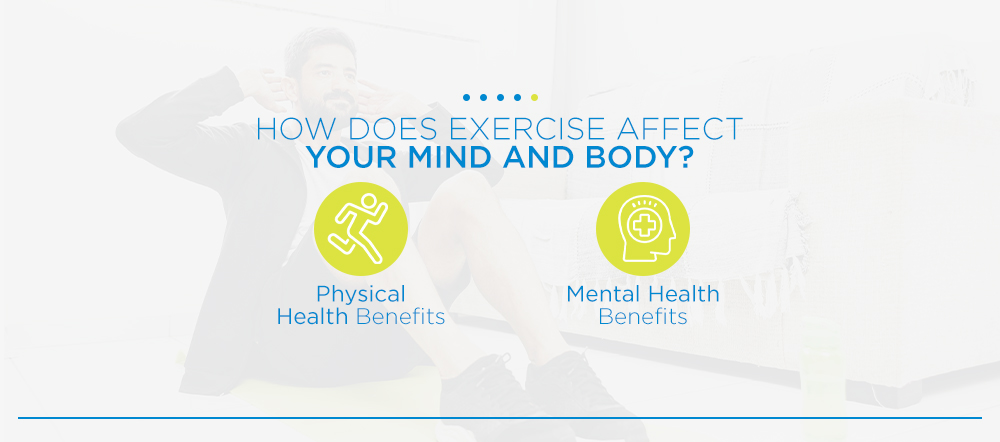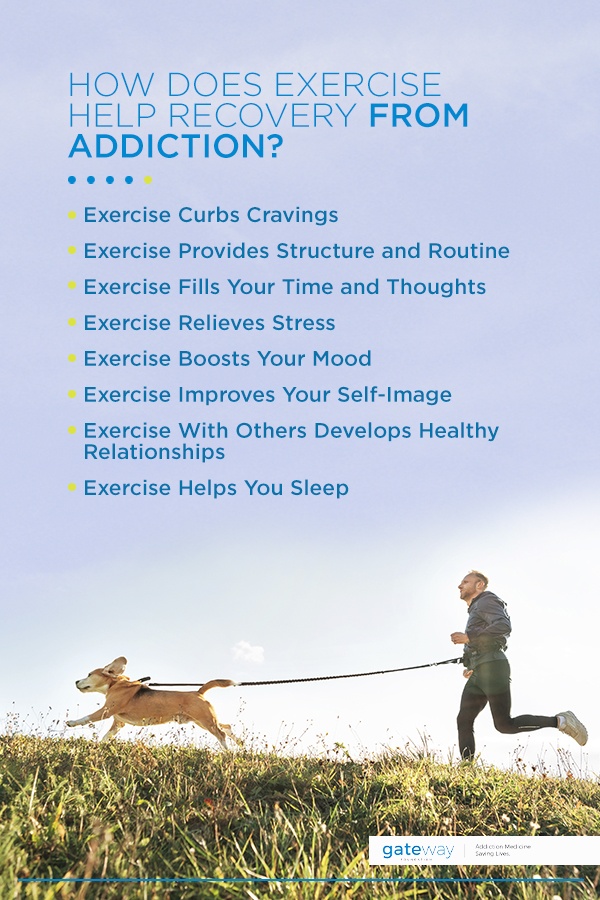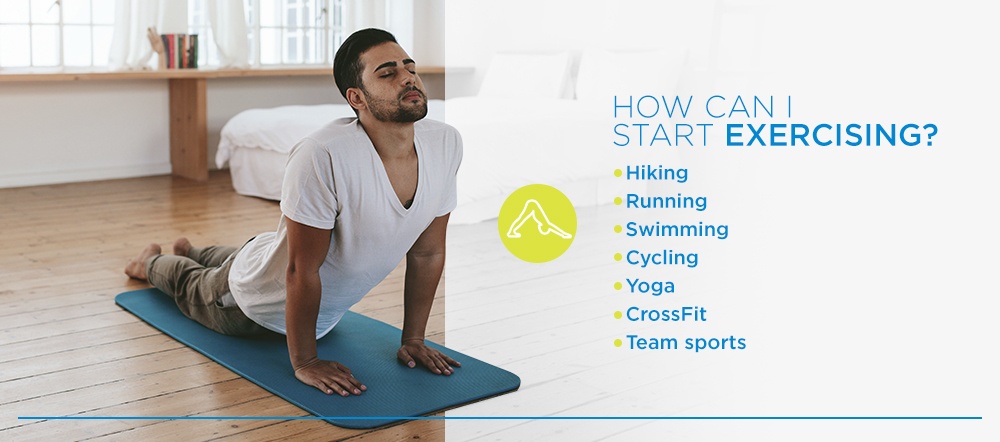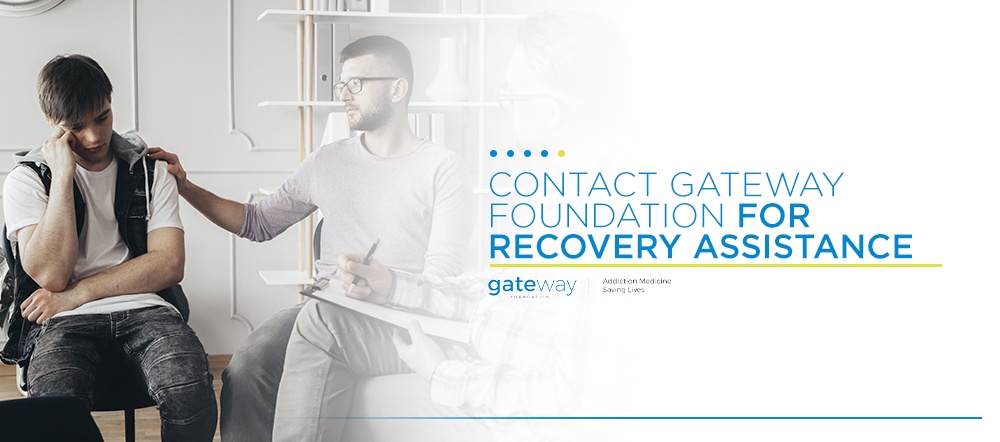- Oct 14
- Drug Addiction TreatmentRecovery
Exercise for Addiction Recovery
The power of following a regular exercise routine to help maintain sobriety is often underestimated. Exercise and addiction recovery can help those trying to prevent a relapse. You may be wondering, how does exercise help with withdrawal? When paired with other types of treatment, exercise can prevent relapse by providing a reliable routine, filling spare time, managing mental health and inspiring higher self-esteem. Although regular exercise can sound daunting, it doesn’t take much movement to start seeing the benefits of getting active on a routine basis.
In this article, we’ll discuss the effects of exercise on your mind and body, why exercise is one of the most powerful tools for sobriety and how you can start seeing the benefits of exercise today.
- How Does Exercise Affect Your Mind and Body?
- How Does Exercise Help Recovery From Addiction?
- How Can I Start Exercising?
- Contact Gateway Foundation for Recovery Assistance
How Does Exercise Affect Your Mind and Body?
When you’re recovering from substance use disorder, exercise is beneficial for both your body and mind. Physical and mental health are more connected than we realize, and exercising gives us the valuable opportunity to improve both at the same time. Let’s take a closer look at the physical and mental health advantages that come with regular exercise.
Physical Health Benefits
Physical activity can help you maintain a healthy weight and strengthen your bones and muscles. Exercise is particularly helpful because weight struggles are commonly connected with substance use recovery — especially for those who quit smoking and experience an increase of appetite due to a nicotine replacement.
The physical health benefits of exercise extend beyond weight management. According to the Centers for Disease Control and Prevention (CDC), getting active for at least 150 minutes per week can reduce the risk of cardiovascular disease, diabetes, some types of cancers and other chronic diseases. Regular exercise can also increase the brain’s amount of new nerve connections, which helps the brain’s healing process from the harmful physiological effects of frequent substance use.
Mental Health Benefits
In addition to physical health perks, regular exercise offers many psychological benefits. When you engage in physical activity, your body releases chemicals called endorphins. These endorphins interact with your brain’s receptors to decrease your perception of pain, much like morphine does. The natural activation of these receptors through exercise does not lead to addiction or dependence. This process can result in positive feelings of euphoria and optimism after each workout.
Forming good mental health habits is especially important for those in recovery because mental health disorders like depression and anxiety often co-occur with addiction. Exercise during recovery can be a key component in improving mental health and generating a more energized outlook on life. Other mental health benefits of exercise include sharper thinking, learning and judgment skills.
How Does Exercise Help Recovery From Addiction?
Recent studies have found that committing to a weekly exercise routine resulted in decreased substance use and even complete abstinence for some participants. How exactly does exercise lead to substance abstinence? Here are eight ways that regular exercise helps sobriety:
1. Exercise Curbs Cravings
Following an exercise regimen can be beneficial for anyone with a history of misusing a substance such as:
In fact, research has shown that regular exercise can lead to an increase of abstinent days. One study’s participants who struggled with substance use disorder committed to routine moderate aerobic exercise for 12 weeks and saw significantly better substance use outcomes than those who did not.
Because working out moves blood through the heart quicker, regular exercise can increase the amount of oxygen and nutrients flowing to your body’s muscles. This increase in nourishment causes the body to grow stronger and have a greater capacity to release energy throughout the day. These higher energy levels then make daily tasks easier and often boost the ability to resist the urge to use drugs.
When paired with regular cognitive-behavioral therapy, exercise is an especially effective method for helping people quit smoking by meeting psychological and physiological needs that a nicotine replacement does not. For these reasons, many former smokers take up exercise to help them quit.
2. Exercise Provides Structure and Routine
Part of what makes regular exercise so powerful for curbing cravings is following a set routine. Signing up for exercise classes or planning a workout regimen provides a concrete routine for each day. Joining a group class or telling someone else about your new exercise commitment will hold you accountable and encourage you to stick to your routine.
Let workouts help structure your day by setting exercise sessions for a certain time. For example, early morning workouts can minimize the temptation to stay up late or drink the night before. Exercising after work can serve as an excuse to skip happy hour. Following a daily structure tailored to typical moments of weakness can make it easier to stay on track.
3. Exercise Fills Your Time and Thoughts
Many people find they have a lot of free time on their hands once they begin the recovery process because they are no longer spending their time thinking about, acquiring or using a substance. This free time can prove to be a blessing or a curse depending on how it is used.
Exercise is a great outlet for this extra time and can take up several hours of the week. It is generally good to keep yourself busy during addiction recovery, especially in the beginning phases. Following a regular exercise routine takes away the need to make split decisions about what to do with spare time throughout the day, which is often when poor choices are made.
Having an exercise goal can also help distract from cravings and redirect thoughts toward something more constructive. For example, training for a half marathon involves more than simply showing up on race day — the months leading up to it will be filled with choosing a progression path, planning pacing, setting goal times and running practice road races.
4. Exercise Relieves Stress
Reducing stress is essential for anyone recovering from substance use disorder because withdrawing from drugs or alcohol can heighten stress. Exercise directly affects the part of the brain that controls stress and anxiety. Both low-intensity and high-intensity forms of exercise are shown to reduce stress, help individuals become more aware of their mental state and grant mental relief.
Physical activity also allows people to focus on the movement of their body, rather than stressors, and stimulates hormones that reduce pain. Regular exercise helps balance the body’s stress hormone levels by managing adrenaline. Adrenaline is an important stress hormone for fight-or-flight responses, but too much of it can damage overall health.
Increasing the heart rate through exercise also triggers the release of serotonin, an anti-stress hormone that improves your sense of well-being. Exercising to alleviate stress is healthier for those who are recovering instead of turning to a substance, overeating or lashing out at others. Different types of physical activity from cycling to meditation can result in increased levels of natural stress-relievers, so there’s a therapeutic exercise for everyone.
5. Exercise Boosts Your Mood
Along with serotonin, exercise releases endorphins and dopamine, which play a large role in regulating mood. Mood swings are often a challenge for those going through the withdrawal or recovery process as the body readjusts to functioning without drugs or alcohol. Regular exercise can help even out these highs and lows by positively affecting your mood. As little as 30 minutes of exercise each day is enough to positively impact mood.
Exercise naturally triggers dopamine, a happiness hormone, which is why that post-workout euphoric feeling is often described as “runner’s high.” Instead of relying on a harmful substance, exercise is a great way to get a rush of happiness and energize your outlook on life. People also tend to feel better about themselves after handling stress well, as opposed to turning back to bad habits.
6. Exercise Improves Your Self-Image
Whether your goal is to lose weight or gain more muscle, exercise can help reinforce positive body-image and raise self-esteem. In general, taking good care of your body boosts self-confidence and makes you feel better about yourself.
Accomplishing a fitness goal can also increase confidence and reinforce the idea that you are capable of doing hard things. This idea is especially important for those on the road to recovery who battle cravings daily. One study found that seeing the encouraging results of regular exercise can have a positive effect on former substance users’ overall motivation to change behavior.
7. Exercise With Others Develops Healthy Relationships
Signing up for a group exercise class at the local gym is a great way to meet people in a sober environment. Meeting new friends in the beginning stages of recovery can be a challenge, but participating in a group class or recreational sports league can introduce you to other people with common interests. Whether it be from winning the league championship together or mutual suffering, sports and exercise tend to bring people together and strengthen bonds.
Some areas even have exercise clubs or programs specifically to support people recovering from addiction. Becoming involved with one of these organizations often helps recovering individuals get connected with others in the community and stay sober. Working out with a group of people can push you, encourage you, keep you accountable and give you new friends.
8. Exercise Helps You Sleep
Sleep is an important component of recovery because, without the proper amount of rest, we’re unable to function at our highest level or make the best choices for ourselves. Fatigue is often a result of poor sleep quality, and it can lead to relapse. Although sound sleep is crucial for those who are recovering, people in the earlier phases of recovery tend to have difficulty sleeping through the night due to withdrawal.
Regular exercise can help you overcome sleeplessness by stimulating the recuperative processes that rebuild strength and restore health during sleep. In fact, research has found that performing at least 150 minutes of moderate to intense physical activity each week can enhance sleep quality by up to 65%. Also, exercising for a short amount of time before going to bed causes your body to cool at a faster rate, which makes it easier to fall asleep.
How Can I Start Exercising?
There are many forms of exercise accessible for a variety of experience levels. When choosing your exercise method, keep in mind that low-impact or low-intensity does not mean less effective. In fact, even walking for 30 minutes per day is enough to bring about health benefits.
You might have to try several different activities before finding the one that’s best for you. By experimenting with different workouts, you’ll figure out what aspects of exercise you enjoy most and which form is right for you. Getting started can be the most difficult step in any fitness journey, but experimenting with different exercises can be fun, and you’ll be surprised how quickly your fitness improves.
These are some of the most popular forms of exercise to try:
- Hiking: You can literally overcome mountains by hiking — talk about a self-confidence boost! Simply being out in nature is enough to kick-start positive mental health effects, and hiking through trails gives you the added benefits of exercise.
- Running: Running regularly is the perfect way to develop self-discipline, burn off stress and achieve personal goals. While running alone offers the chance to sort through your thoughts or listen to music, running with others is a great way to get to know people and plug into the running community.
- Swimming: As a low-impact cardio activity, swimming is perfect for anyone with sensitive joints or a history of injury. The coolness of the water can also relieve the tension, soreness and aches that sometimes come with withdrawal.
- Cycling: Whether you sign up for a group spin class or take your bike out to the trails, cycling is another form of exercise that will get the blood flowing while being easy on the joints.
- Yoga: Yoga trains the mind along with the body. Practicing yoga can improve self-awareness and mindfulness, reduce stress and decrease pain. Routine yoga can even help those in recovery to cut cravings and better their mental health.
- CrossFit: For those looking for something a bit more high-speed, CrossFit is an intensive fitness program that incorporates various strength-building exercises, teamwork and healthy nutrition. These ingredients make CrossFit perfect for increasing participants’ self-esteem and happiness.
- Team sports: Joining a community basketball, soccer, volleyball or tennis team offers you the benefits of exercise and social connections. You can establish healthy habits along with strong relationships by signing up for a local team.
Other great forms of exercise include:
- Lifting weights
- Boxing
- Surfing
- Skiing
- Snowboarding
- Dance
- Martial arts
- Rock climbing
The options are endless, and no type of exercise is necessarily better than the others. Choose whichever activity best suits your interests, abilities and motivation, and get moving.
Contact Gateway Foundation for Recovery Assistance
Exercise alone isn’t enough to solve substance use disorder. If you or your loved one struggles with substance use, let the Gateway Foundation provide the resources needed to stay sober. At Gateway Foundation, we offer a full continuum of care for a variety of addictions, and we pledge to stay with you for life.
With multiple locations and more than 50 years of experience, Gateway knows how to approach rehabilitation to yield positive results. If you or a loved one is looking for high-quality addiction treatment from caring individuals, contact Gateway Foundation to book an appointment today.






